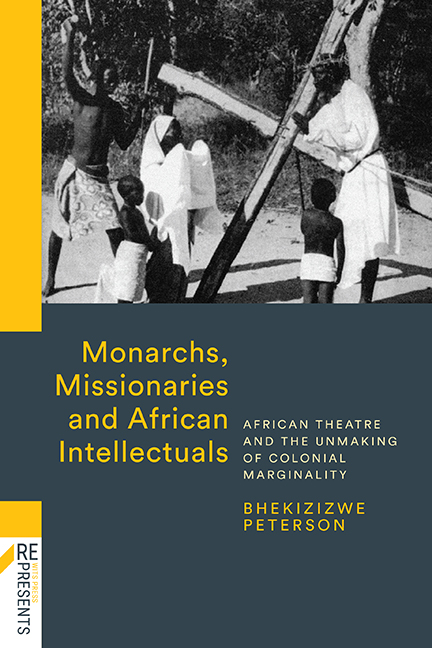 Monarchs, Missionaries and African Intellectuals
Monarchs, Missionaries and African Intellectuals Book contents
- Frontmatter
- Dedication
- Contents
- Preface and Acknowledgements
- Note on Zulu Orthography
- Introduction: Staging the (Alien)nation: African Theatre and the Colonial Experience
- 1 ‘All Work and No Play Makes Civilisation Unattractive to the Masses’: Theatre and Mission Education at Mariannhill
- 2 ‘I Will Open My Mouth in Parables’:Accounting for the Crevices in Redemption
- 3 Parallel Time, Parallel Signs, Discordant Interpretations
- 4 B.W. Vilakazi and the Poetics of the Mental War Zone
- 5 The Bantu Men’s Social Centre: Meeting the Devil on his own Ground
- 6 The Bantu Dramatic Society According to a Gossip Columnist
- 7 Contesting ‘The Bantu Imagination’: The British Drama League & The New Africans
- 8 H.I.E. Dhlomo: Measuring the Distance Between Armageddon and Revolution
- 9 ‘The Black Bulls’: Assembling the Broken Gourds
- 10 Hegemony and Identity: What a Difference ‘Play’ Makes
- Notes
- Bibliography
- Index
7 - Contesting ‘The Bantu Imagination’: The British Drama League & The New Africans
Published online by Cambridge University Press: 12 October 2021
- Frontmatter
- Dedication
- Contents
- Preface and Acknowledgements
- Note on Zulu Orthography
- Introduction: Staging the (Alien)nation: African Theatre and the Colonial Experience
- 1 ‘All Work and No Play Makes Civilisation Unattractive to the Masses’: Theatre and Mission Education at Mariannhill
- 2 ‘I Will Open My Mouth in Parables’:Accounting for the Crevices in Redemption
- 3 Parallel Time, Parallel Signs, Discordant Interpretations
- 4 B.W. Vilakazi and the Poetics of the Mental War Zone
- 5 The Bantu Men’s Social Centre: Meeting the Devil on his own Ground
- 6 The Bantu Dramatic Society According to a Gossip Columnist
- 7 Contesting ‘The Bantu Imagination’: The British Drama League & The New Africans
- 8 H.I.E. Dhlomo: Measuring the Distance Between Armageddon and Revolution
- 9 ‘The Black Bulls’: Assembling the Broken Gourds
- 10 Hegemony and Identity: What a Difference ‘Play’ Makes
- Notes
- Bibliography
- Index
Summary
The public prominence of theatre at the Bantu Men's Social Centre and its promotion in African schools on the Witwatersrand coincided with considerable argument over African drama. The novel departure in the 1930s was that the religious and pedagogic functions of drama were superseded by contestations over identity politics that stemmed from the confluence of nationality, language and culture. One such remarkable debate was between white cultural philanthropists and urbanised, educated ‘new’ Africans. The conflict revolved around attempts to define the social nature and role of African drama, a preoccupation that was seen as crucial to the apprehension of African identity and alterity. It followed the renewed interest in whether African cultural practices could serve as a bulwark against the oppressive and exploitative results of modernity. An attendant concern was whether African appropriations of imperial cultural practices were strategic responses to the ambiguities and paradoxes of conquest or whether they were simply manifestations of African alienation. The polemic divide assumed a Manichean polarity between the defenders of the authenticity and purity of Africanness and advocates of the ‘new African’ who exalted in the mutation of African culture with influences from elsewhere on the globe, including Europe and America. In both cases, the politics of identity and representation were broached from the premise that the instances of nationality and culture were intertwined. This meant that the practice of cultural activities like African performance was charged with social significances that foretold the demise or survival of the race.
This chapter, and the one that follows, explore the interaction and constitutive influence exercised by key individuals and groups involved in the dialogic polemics on African theatre on the Witwatersrand. The current chapter looks at this topic from the point of view of the imperial and white imaginations that were predisposed towards notions of racial absolutism. The representative elements are the British Drama League and Bertha Slosberg, an impresario who worked with the important troupe of African performers, the Mtetwa Lucky Stars. Slosberg's ideas and schemes were strongly consistent with many of the aims of the League, hence the decision to discuss her activities within the unfolding imperial influence.
- Type
- Chapter
- Information
- Monarchs, Missionaries and African IntellectualsAfrican Theatre and the Unmaking of Colonial Marginality, pp. 165 - 186Publisher: Wits University PressPrint publication year: 2021


